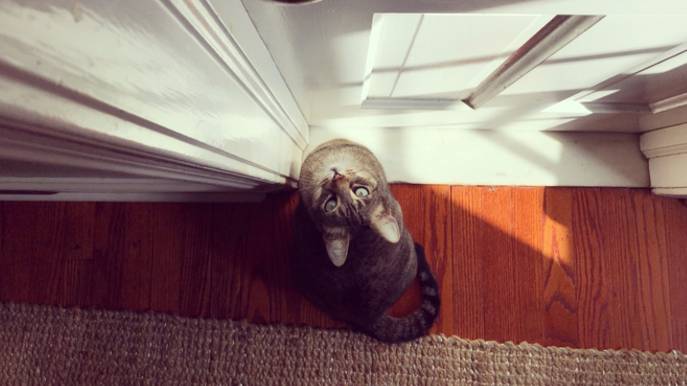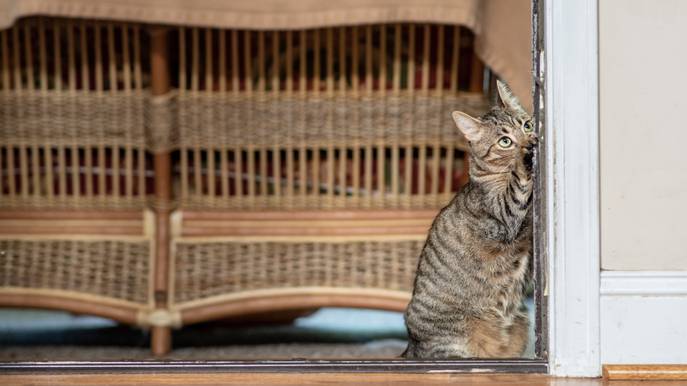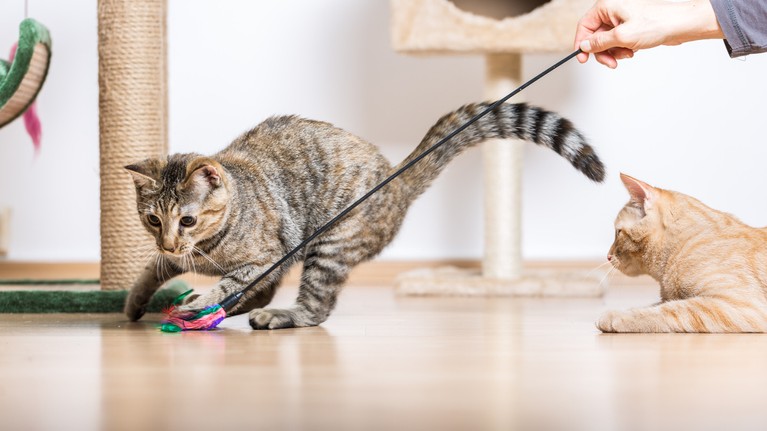Nine ways to stop your cat scratching at the door
Want to stop your cat scratching at the door? We share with you a cat behaviorist’s insight into this common problem behavior

To stop your cat from scratching at the door, it’s important to first work out why they might be doing it. When you’ve provided all the best cat toys or scratching posts, spent lots of time with your feline friend, and made sure they’ve had their food… you might be frustrated, wondering what else do they need?
Just like the answer to the question 'why does my cat scratch the wall?', your cat scratching at the door may be caused by a number of reasons - this can be behaviourally anything from boredom to anxiety, or it can simply be down to the length of their claws.
While scratching is a common cat behavior it can be a nuisance for pet owners. The sound might be annoying - especially if it’s happening at night - or your cat might be damaging your doors. You might also be worried about your cat’s emotional welfare, wondering if they’re distressed.
So what do we do to stop our cats from scratching in the wrong place? We’ve enlisted the help of cat behaviourist Ruby Leslie to share with you nine top ways to stop your cat scratching and save your doors from further damage.

Ruby is the founder of Welfare for Animals, a companion animal welfare and training social enterprise. She is a certified feline and canine behaviorist and animal welfare professional based in Calgary, Alberta, Canada. Ruby works internationally to train pet guardians, shelters, and force-free animal professionals through training and her animal welfare project: Trainers for Rescues.
Why is my cat scratching at the door?

1. Get your cat checked by your vet
Cats scratch to remove old nail sheaths, allowing room for new sharper nails. Your veterinarian can help you with your cat's nail health and check to ensure your cat is overall physically well. Anxiety can be caused by ill-health so if your cat isn’t feeling good, they could scratch more.
2. Use pheromones and calming scents
If your cat is feeling stressed, spraying your doors or the surrounding areas with pheromone sprays or calming, cat-friendly scents can be a great way to help them feel more relaxed. It’s important to avoid using any scents that might deter your cat from going near the door as this could increase their feelings of stress.
3. Provide scratching posts
Cat Behaviorist Ruby Leslie suggests that you “Provide plenty of vertical and horizontal opportunities for your cat to scratch and encourage them to scratch there”. She recommends that you reward your cat with food when they scratch in these desired spots so that they’ll be more likely to scratch there instead of on your doors.
Get the best advice, tips and top tech for your beloved Pets
4. Get a pet camera
If your cat is only scratching the door when you’re not there with them, this may be a sign that they’re bored or anxious when alone. Filming them with a pet camera can be a good way to understand what they’re feeling as you’ll be able to look out for other behaviors such as meowing, pacing, or playing.

5. Mental stimulation
While we usually talk about training in relation to dogs, cats can just as equally benefit from a mental workout. Teaching your cat some simple tricks such as retrieving toys or giving you a high five, can help to tire them out mentally. A mentally tired cat is more likely to relax and sleep the rest of the day.
6. Playtime
Just as tiring your cat out mentally can be helpful, it’s also good for them to get a good physical workout. Never underestimate the importance of cat play - you can provide them with appropriate playtime using a cat wand or puzzle feeder toy. Regular play and exercise will help reduce the chances that your cat is scratching the door out or boredom.
7. Add a cat door
Your cat might be scratching your doors as a way to try and escape your home to roam or toilet outside. As Leslie says, “By adding in a cat door to your home, they have the freedom to come and go as they please”.
8. Be aware of neighborhood cats
If there are other local outdoor neighboring cats that roam close to your home, they could be causing your own cat some distress. Leslie adds that regularly using “Pheromones on your door can help to create calmness for your cat”.
9. Trim your cat's nails
It might sound simple but just by keeping on top of your cat’s pedicures, you could save a whole lot of scratching. If your cat's nails are too long, they may scratch more frequently to remove the nail sheaths - the older parts of their nails.
Why is my cat scratching at the door?
There are a number of reasons that your cat might be scratching at the door. As Leslie explains, these reasons can include “A form of scent or communication marking; expressing emotions such as stress or frustration due to a lack of appropriate scratching items in the home; or as a means to remove the old nail sheaths.” She adds that “Cats have to scratch to meet their basic needs and love scratching vertical, sturdy structures that they can easily dig their nails into”.
You may notice that your cat’s preferred scratching places tend to include doors, sofas, or table legs. That's due to them being similar in structure to tree trunks or logs that cats would typically scratch outside.
Just as we may see dogs chewing when they’re stressed or bored, cats will use scratching in a similar way. It can help them to relieve a range of different emotions. Leslie says it’s important to understand that “If your cat has anxiety, they might be scratching at the door to try and escape”. She notes that “If you suspect this is the case, take a video of your cat when it’s left home alone and seek help from your vet immediately”.
Is it cruel to ignore a cat scratching at the door?
Whenever we see signs that our pets are out-of-sorts, it is important that we address the situation as soon as possible. It could be that there’s something physically wrong with your cat which needs veterinary support or perhaps your cat is struggling emotionally. Either way, simply ignoring your cat scratching at the door is not going to resolve the underlying reason behind the behavior.
As Leslie says, “If your cat has anxiety or is simply using your door to scratch, by not taking your cat to the vet or providing them with appropriate scratching posts, you are not meeting their emotional, physical or welfare needs, which is cruel”.
Ignored behavior can get worse. This can result in more stress for you, their carer, but can potentially be very problematic for that cat themselves. Leslie explains, “Cats become easily stressed and if this stress is not addressed it will turn into chronic stress which can lead to diseases”. So for your cat’s long-term health it’s important to seek out help to support them.

Caroline Wilkinson is a Certified Animal Behaviorist. She is a Full (assessed) Member of the Association of Professional Dog Trainersand INTODogs – as well as a Registered Training Instructor (ABTC). Caroline is also a Certified Real Dog Yoga Practitioner and an Applied Canine Zoopharmacognosist.
As the founder of digital pet coaching service Barket Place, Caroline has a passion for improving connections between human and hound, with a focus on relationships and reduction of stress for canines living in a human world. She helps pet parents, like you, to work through challenges they may be experiencing with their dog's behavior, so that they can get back to the important job of loving their dog.
Caroline writes for Edition Dog Magazine, as well as a number of trusted pet brands. She also speaks around the country – presenting workshops and webinars with a focus on living more mindfully alongside our canine companions. She is also the co-host of chart-topping podcast, ‘Supporting Both Ends of the Lead’ and has spoken about dangerous dogs on BBC Points West and BBC Radio Bristol.
